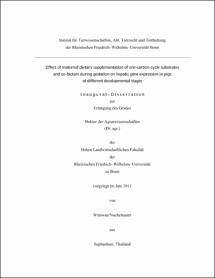Nuchchanart, Wirawan: Effect of maternal dietary supplementation of one-carbon-cycle substrates and co-factors during gestation on hepatic gene expression in pigs at different developmental stages. - Bonn, 2011. - Dissertation, Rheinische Friedrich-Wilhelms-Universität Bonn.
Online-Ausgabe in bonndoc: https://nbn-resolving.org/urn:nbn:de:hbz:5N-26678
Online-Ausgabe in bonndoc: https://nbn-resolving.org/urn:nbn:de:hbz:5N-26678
@phdthesis{handle:20.500.11811/4754,
urn: https://nbn-resolving.org/urn:nbn:de:hbz:5N-26678,
author = {{Wirawan Nuchchanart}},
title = {Effect of maternal dietary supplementation of one-carbon-cycle substrates and co-factors during gestation on hepatic gene expression in pigs at different developmental stages},
school = {Rheinische Friedrich-Wilhelms-Universität Bonn},
year = 2011,
month = oct,
note = {German Landrace (DL) and Pietrain (PI) sows were fed either a gestation diet supplemented with substractes and co-factors of the one-carbon-cycle ('MET') or a control ('CON') gestation diet. Fetal liver tissue of day 35, 63 and 91 post conception (dpc) and a postnatal stage (158 dies post natum, dpn) was subsequently monitored for diet-dependent differential gene expression. The hepatic expression profiles revealed transcripts differentially expressed in DL (2055, 641, 2475 and 327 transcripts) and PI (618, 1539, 1592 and 112 transcripts) on day 35, 63 and 91 post conception and at postnatal stage, respectively. The pathway categories that were consistently affected comprise growth factor signaling, cellular growth, proliferation development, intercellular and second messenger signaling, amino acid metabolism, apoptosis and nuclear receptor signaling. Differential expression between 'CON' and 'MET' was confirmed via quatitative real-time PCR for 11 genes from DL (BHMT, DNMT1, AMD1, IGFBP3, IGFBP5, SHC1, AAK1, SMAD5, MAP3K7, IGF1, SOCS3) and 12 genes from PI (PFN, Rho, PAK, IGFBP3, IGFBP5, IGF2R, BHMT, DNMT1, MTAP, FOXO1, BCL2, MAFG) all of which were selected from relevant canonical pathways. The important canonical pathways modulated by the gestation diets in both breeds included the methionine metabolism pathway, the IGF-1 signaling pathway and the growth hormone signaling pathway. We assessed the hepatic S-adenosylmethionine (SAM) and the S-adenosylhomocysteine (SAH) concentrations as well as the SAM/SAH ratio in sows and fetuses from DL and PI. The SAM/SAH ratio of fetuses was lower in 'MET' than in 'CON', which is closely linked to the inhibition of transmethylation reactions and conforms to results from global DNA methylation. In conclusion, supplementation of gestation diets with substrates and co-factors of the one-carbon-cycle affects hepatic gene expression as well as traits related to growth and meat performance at prenatal and postnatal stages, dependent on the developmental stage and the breed.},
url = {https://hdl.handle.net/20.500.11811/4754}
}
urn: https://nbn-resolving.org/urn:nbn:de:hbz:5N-26678,
author = {{Wirawan Nuchchanart}},
title = {Effect of maternal dietary supplementation of one-carbon-cycle substrates and co-factors during gestation on hepatic gene expression in pigs at different developmental stages},
school = {Rheinische Friedrich-Wilhelms-Universität Bonn},
year = 2011,
month = oct,
note = {German Landrace (DL) and Pietrain (PI) sows were fed either a gestation diet supplemented with substractes and co-factors of the one-carbon-cycle ('MET') or a control ('CON') gestation diet. Fetal liver tissue of day 35, 63 and 91 post conception (dpc) and a postnatal stage (158 dies post natum, dpn) was subsequently monitored for diet-dependent differential gene expression. The hepatic expression profiles revealed transcripts differentially expressed in DL (2055, 641, 2475 and 327 transcripts) and PI (618, 1539, 1592 and 112 transcripts) on day 35, 63 and 91 post conception and at postnatal stage, respectively. The pathway categories that were consistently affected comprise growth factor signaling, cellular growth, proliferation development, intercellular and second messenger signaling, amino acid metabolism, apoptosis and nuclear receptor signaling. Differential expression between 'CON' and 'MET' was confirmed via quatitative real-time PCR for 11 genes from DL (BHMT, DNMT1, AMD1, IGFBP3, IGFBP5, SHC1, AAK1, SMAD5, MAP3K7, IGF1, SOCS3) and 12 genes from PI (PFN, Rho, PAK, IGFBP3, IGFBP5, IGF2R, BHMT, DNMT1, MTAP, FOXO1, BCL2, MAFG) all of which were selected from relevant canonical pathways. The important canonical pathways modulated by the gestation diets in both breeds included the methionine metabolism pathway, the IGF-1 signaling pathway and the growth hormone signaling pathway. We assessed the hepatic S-adenosylmethionine (SAM) and the S-adenosylhomocysteine (SAH) concentrations as well as the SAM/SAH ratio in sows and fetuses from DL and PI. The SAM/SAH ratio of fetuses was lower in 'MET' than in 'CON', which is closely linked to the inhibition of transmethylation reactions and conforms to results from global DNA methylation. In conclusion, supplementation of gestation diets with substrates and co-factors of the one-carbon-cycle affects hepatic gene expression as well as traits related to growth and meat performance at prenatal and postnatal stages, dependent on the developmental stage and the breed.},
url = {https://hdl.handle.net/20.500.11811/4754}
}






